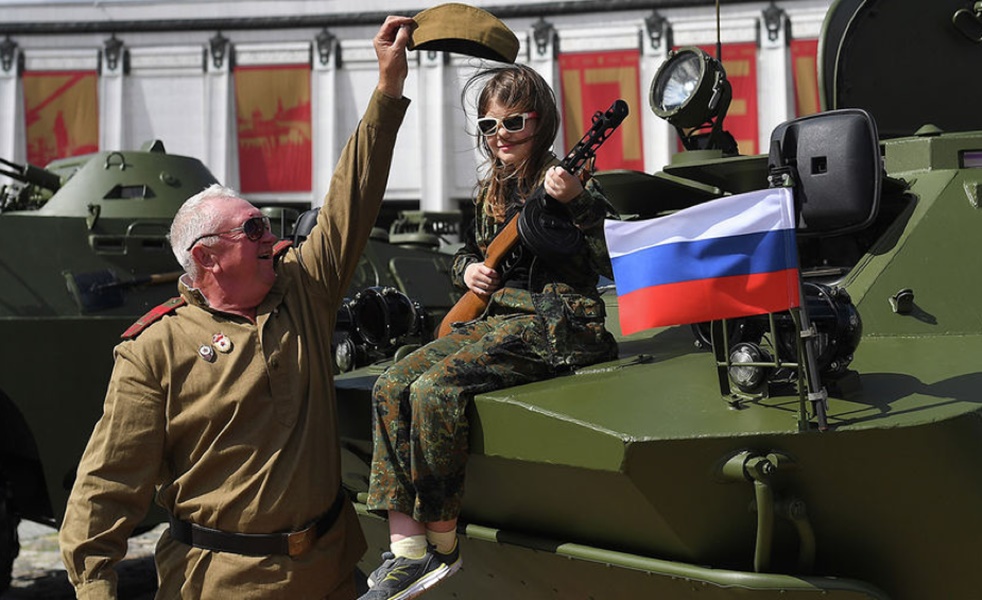«De-Nazification» of Ukraine is one of the key objectives of and main justifications behind the Russian invasion. These days, the Kremlin media brand all those who oppose Russian aggression as “neo-Nazis.”
It is worth noting that at the onset of the invasion, Russian propaganda clearly separated the Ukrainian “fraternal people” from the “criminal regime” in Kyiv. In his address in the early hours of February 24, Putin said, addressing the Armed Forces of Ukraine: “Take power into your own hands. It looks like it will be easier for us to come to terms with you than with this gang of drug addicts and neo-Nazis, who settled in Kyiv and took the entire Ukrainian people hostage.”
Later, the Kremlin and the pro-government media began to substitute certain concepts: “nationalists” and “neo-Nazis” became synonymous with the Ukrainian Army, volunteer battalions, and territorial defense forces, which undoubtedly put up massive resistance to the Russian troops. Pro-Kremlin media headlines and newscast rhetoric are replete with phrases about “hours spent under targeted fire by nationalists” or Russian units and their proxies “who managed to drive nationalists out of the most residential areas in the city.” Moreover, after a month of war, Kremlin propagandists refer to almost all Ukrainians daring to oppose Russian occupation as “Nazis.” For example, for Margarita Simonyan, the head of one of the Kremlin’s main mouthpieces, RT, it came as an unpleasant surprise that «a significant part of Ukraine was engulfed in the madness of Nazism.» At one of the panel shows, she said: “Previously, I also thought that there were a few of them, but I definitely could not imagine that there were so many!”
Why does Russian propaganda massively and indiscriminately brands all Ukrainians as Nazis? First of all, it’s about dehumanizing the nation in the eyes of the Russians. The Kremlin needs to give them something that will make Russians hate Ukrainians and justify in their eyes the atrocities committed against Ukrainians by the Russian military, the annihilation of Ukrainian cities. How could this be done? It turned out to be that simple: to an average Russian, who has been under the harsh influence of the Kremlin’s propaganda machine for years, it’s enough to say: «You know what? They are all Nazis there, we shouldn’t feel sorry for them, it’s okay to kill them all!” Which is what the Russian forces are doing.
Meanwhile, in Russia, people get detained and prosecuted for phrases such as “No to fascism” and “fascism shall not pass” – such slogans are now equated with “discrediting” the Armed Forces of the Russian Federation.
Putin’s statements that the power in Ukraine is controlled by neo-Nazis is nothing but perfidious insinuation. As any other country, Ukraine has some problems with far-right movements. In Russia itself, there are no fewer ultra-right, neo-Nazi and nationalist, sharply xenophobic groups and organizations close to them in spirit. Moreover, there are people today in the Russian power circles who back in the day used to openly back extremely nationalist views and participated in the infamous “Russian Marches.” Traditionally, Russian law enforcement are trying to find a “Ukrainian trace” in pretty much anything, presenting ultra-right groups as «branches of Ukrainian radical movements.»
The Russian ultra-right are quite often in the news focus, there are still plenty of skinhead gangs that go out terrorizing and murdering representatives of various Central Asian ethnic groups, while caveman nationalists keep chanting their favorite “Moscow is for Muscovites” song.
Everyone knows that Russia has long and regularly accused former Soviet republics that have made integration with the civilized world and Europe their priority of «rehabilitating Nazism and supporting neo-Nazism,» being itself its main breeding ground.

